The Very Important List Of PC Games, Part 1/5
Here at Rock, Paper, Shotgun we take the business of PC gaming entirely seriously. There is no smiling, or making rude noises at the back of class, there is only important gaming fact. So when it came to compiling an exhaustive list of the greatest, most important PC games of all time, we realised that the only way we could articulate the importance of the various titles was to present them as a five-part series of important lectures, explaining their importance. Over the next four articles and related appendices, you will discover why the various Great Games are great, and what their meaning is to you as a PC gamer. Follow this list, and play these games, and you will find yourself with very little spare time. But also, you will understand what it truly means to be a PC gamer.
Brilliantly, Intel have elected to sponsor this feature as part of their AppUp developer program. So thanks to them! And any developers reading should definitely make some All Time Best Games Ever alongside your apps, because that would just work out for everyone. Now then, let's make a list. The first lecturer to the podium is Dr Rossignol...
Hello, everyone! What follows should be imagined as a Powerpoint slideshow, or similar, because I am making a presentation of, and an argument for, a bunch of games that I think are critical to the existence of PC gamers. And don't read this and then say “what about X-Com!”, because that's in Dr Meer's lecture, along with a lot of very other important things.
This, as the title suggests, is simply Part One, and is the list of games that I am charged with talking about. By coincidence, I spend a lot of time talking about all the games that I think are important to the First Person Perspective dominance of so much of PC gaming. That really is actually an accident, but it seems like a useful one. And let me stress that these games are split between five essays, and that the full, merged list will be made public at the end of this five-part series. And with that reiterated, let us begin.
PLEASE NOTE: I have listed this group of games by descending importanceness.
Doom
RELEASE DATE: 1993
IMPORTANCENESS: Extremely high.
To start with Doom is not to start at the beginning, but to start at the most important: to climb atop a towering spike in the middle of the great graph of PC gaming development. We had already covered vast distances by the time Doom came along, but the point about Doom is that it is a landmark, a beacon, a waypoint, and a scene of transformation. It was not the first of the first-person games, but it was the point at which the first-person perspective took up its enormous significance within the landscape of PC gaming. Suddenly, our understanding of what kind of experience games were to offer had changed. There was suddenly depth, and zombies, and rocket-launchers, and cyber-demons. There was fear. But there was also co-op networked play, and user-made maps, and shareware versions of an incredible game circulated freely over the internet. If ever there is a triumphal arch through which PC gaming moved into a modern age, then it is the large M at the end of Doom. Does that metaphor work? No.
See also: Doom 2.
Half-Life
RELEASE DATE: 1998
IMPORTANCENESS: So, so incredibly high, basically

In the late Nineties the first-person shooter chewed up its cardboard packaging and combined it with a special saliva to make a chrysalis, into which it then crawled. What emerged from that miraculous tube of transformation was Half-Life, a game which made the world of a shooter game into seamless, dynamic, and intelligent thing. It was a remarkable trick: not diluting the action-element of the FPS, but impregnating every aspect of it with story. It was scripted, it had a script, but it never controlled the character or took the motive out of your hands. Half-Life was a game that made people realise that making interesting moments, staging microscoping dramas amid the carnage, would make games live anew. Things would never be the same again.
Half-Life 2
RELEASE DATE: 2004
IMPORTANCNESS: Very High

“Things would never be the same again,” seems a bit of a silly thing to say, but I've said it now. Surely it's always literally true? Anyway, Half-Life 2 wasn't quite the ecosystem-wrecking genesis-meteor that the original was, but instead articulated the mature statement of that previous game's studio. Using all the same techniques, honed to razor-sharpness, and throwing in a brilliant set of physics-manipulating puzzles, Half-Life 2 broadened the mandate for first person games to include awesome companions, and puzzles that involved more than simply killing lots of similar-but-different enemy zombie-demons. It was also a game that its own exclamation: "Physics!" That is what we would cry.
System Shock
RELEASE DATE: 1994
IMPORTANCENESS: Quite High

Long before the Half-Lives, of course, there were other experiments in first-personess that really meant something. Chief among these in the mid-nineties was, arguably, System Shock. This was one of the games that acts like a landmark at the borders What Is Possible In Games. Lost in the belly of a giant space station and hunted by malignant AI, this game tore at definitions of both RPG and FPS, before either RPG or FPS were really defined. Made more playable today by a mouse-look mod, it remains a kind of masterwork of the balance between complexity and necessity in game design.
Counter-Strike
RELEASE DATE: Various Dates
IMPORTANCENESS: Worringly High

Counter-Strike was practically all that was played in the PC Gamer office when I arrived in 2001. The game has remained consistently popular on the wider internet since that time. As I will argue later, the Quakes represent a higher level of design in terms of multiplayer games, but I believe that Counter-Strike had a greater influence on game design than any other multiplayer shooter. The widespread shift towards pseudo-realism and “real-world” settings for manshooting can, I believe, be traced to this mod. That it was a mod, of course, has been celebrated for years, and as such it remains the ultimate example of how modding on the PC has had a profound influence on the entire culture of game design.
Battlezone
RELEASE DATE: 1998
IMPORTANCENESS: An Austere Martian High

Battlezone was a rare and beautiful creation: a shooter that carried on the tradition of bold vehicular things like Carrier Command and Armageddon, but also sat in its own creative bubble. I regard Battlezone as crucially important because it did so many things that PC games do well: vehicles, terrain, genre-blending, and moving between tactics and strategy in a single engine. It also had an excellent fiction underlying it: of the Cold War extending into space, and then breaking out into violence on Mars. The difference between Russian and American sides still lingers in my imagination.
Also see: Battlezone 2, Hostile Waters.
PlanetSide
RELEASE DATE: 2003
IMPORTANCENESS: High

There has only really been one MMOFPS, and this is it. Whatever happened after the launch – and what happened was a plan of expansion and development that looked like an unhappy ape had been placed at the controls, ultimately ruining the game's ability to maintain a high population of combatants – it remains a singularity in the landscape of gaming. We've written about its capacity to create experiences, and for those experiences to create veterans. It's a shadow of a former self now, of course, but it's coming back. For that reason alone it is enormously important. How SOE handle the remake later this year will be one of the most critical and interesting events of the decade. No pressure or anything, guys...
Unreal Tournament 2004
RELEASE DATE: 2003. No wait, it was 2004,
IMPORTANCENESS: Vitally high

Looking back, it's easy to concentrate on all the mods and things that UT2004 spawned. It was an amazing piece of work for the creative folks among us, and it spawned amazing things like Air Buccaneers. However, it was also an astoundingly well-engineered piece of gaming technology. The Unreal engine was, at this point, as smooth as a marble, and the game that sold it was only slightly less fun to play than its nearest rival, the awesome...
Quake III: Arena
RELEASE DATE: 1999
IMPORTANCENESS: Riding a rocket
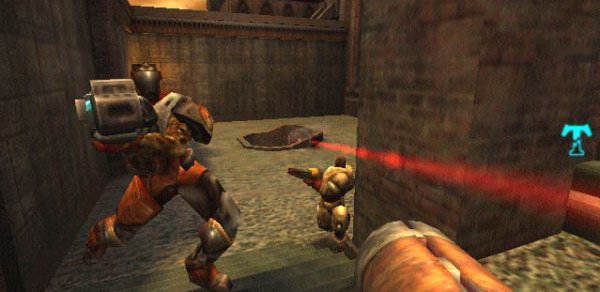
Yes, my evidence might not be entirely impartial on this one. I was hooked on Quake 3 from the day of its release for almost three years. The pace and precision of it became the most important thing in my life for quite some time, even losing me my job at the time. It remains Id's greatest work of game design, but its legacy was short, despite the continued life of the thing in Quake Live. Slower paced more “realistic” games quickly smothered the deathmatch future we were promised. Quake 3 is like a velociraptor of game design. Ultimately a dead end, evolutionary speaking, but a killer if you ever have to face it down in the real world. We shall never know its like again.
Arma II
RELEASE DATE: 2009
IMPORTANCENESS: Moderately high
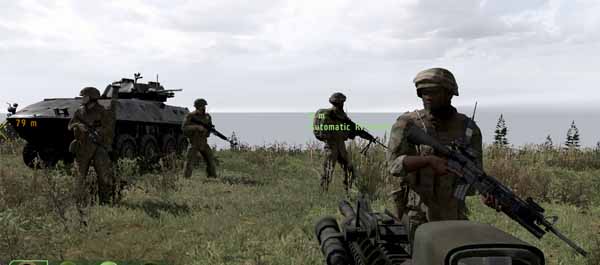
One of my colleagues will iterate the importance of Operation Flashpoint within the grand scheme of games, but it is down to me to highlight where the arc of soldier simulation, that began with OpFlash, now sits. Arma II – a huge, demanding, unoptimised monstrosity of feature heaviness – is unlike anything else in the gaming landscape. Buggy on release, not ideal for single-player – the problems with it are considerable, and they all pale into nothing against the technical achievement and possibility for military simulation experiences that are disgorged from this game on a daily basis.
STALKER: Shadow Of Chernobyl
RELEASE DATE: 2007
IMPORTANCENESS: Moderate

It would please me to be able to say that Stalker was more important than it actually is, but it sadly remains one of those games that is out in an isolated intellectual region, unencroached by the large trade of ideas from other games. Plenty of games from the West have influenced Stalker, but I've yet to see any Western studios mimicking GSC's achievements. Is that because Stalker is bad or unimportant? No, it's because most game studios are basically boring, or hideously constrained. The lack of constraint that GSC were under for Call Of Pripyat shows (thankfully) that the brilliance of the original game wasn't all down to THQ's money and expert producers.
Quake
RELEASE DATE: 1996
IMPORTANCENESS: Higher than you'd think
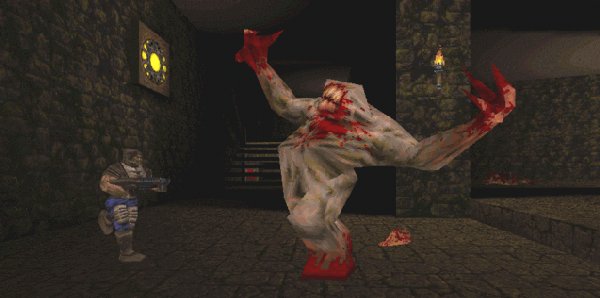
Quake did not invent mouse free-look (that was arguably Marathon on the Mac), but it did make it a standard control method. It also spawned the most intense use of the mouse-keyboard control system to date, with the astonishing QuakeWorld multiplayer. That said, I do believe the single-player game to be overlooked at your peril: it remains fiercely playable, and a reminder of how brutal and thrilling things could be before the transformations of Half-Life.
Left 4 Dead 2
RELEASE DATE: 2009
IMPORTANCENESS: Moderately moderate
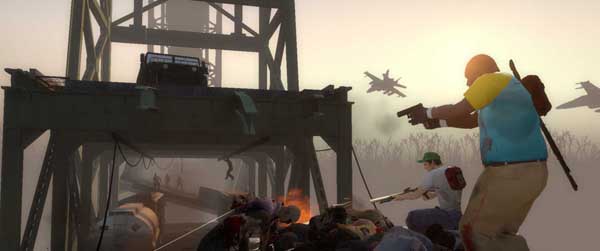
Including this in the list was complicated. A sequel not that different to the original, and not a game that I felt, on its first outing, really changed anything. However, it seems clear that Left 4 Dead 2 was both closer to what was intended for the game, and also a huge move in the direction of pure co-op, which wasn't something that even seemed possible a few years ago. At the start of the 00s I remember asking developers about their plans to make things co-operative, and the consistent answer was that it was too difficult, or not possible, or whatever. Valve looked at that notion, assumed it was possible, and turned the FPS on its head. And the world is richer for that.
Vampire The Masquerade: Bloodlines
RELEASE DATE: 2004
IMPORTANCENESS: Moderate

There was no greater tragedy in the game world of 2004 than the unfinished state of Bloodlines. This was a game that reached for the stars: a multi-threaded RPG with action elements, brilliant dialogue, a story that made sense and even surprised us at times. What a shame it degraded into a ludicrous meat-grinder at the end of the game, if you hadn't hit a show-stopping bug before that time. Bloodlines is important because it signposts a direction to a future of games that we were denied. It is a lament, and a warning. It's also brilliant.
Battlefield 2
RELEASE DATE: 2005
IMPORTANCENESS: Not high enough to avoid the flak

If there was any need to explain the significance of Battlefield 2, then we only need to point to the hype being generated for its sequel, some six years on. Combining squad-based combat across huge maps, with realistic-but-actually-still-silly physics and general handling made this a videogame charged with manshoot satisfaction. It never really seemed to ever hit a perfect balance, either, which somehow seems quintessential of the most profoundly PC games.
Also see: Battlefield 1942
Team Fortress 2
RELEASE DATE: 2007
IMPORTANCENESS: High enough.
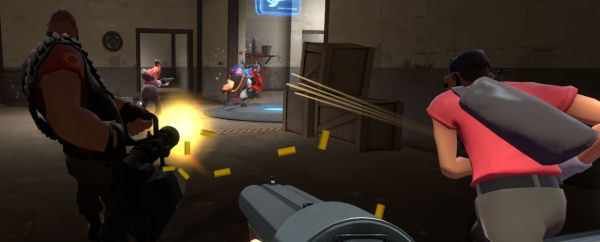
That Team Fortress 2 is a sequel and a remake seems almost irrelevant now. But it's part of what makes the game so important. Valve took years and years to settle upon a model for what has become one of the firmly-entrenched favourites of the PC gaming fraternity, and that they did so allowed it to prove that a multiplayer first-person shooter can be funny, even witty, and that constant experimentation and progression can keep a game alive and evolving long after it should have ground to a halt. Team Fortress 2 felt like an experiment, and it still feels like an experiment, and that experiment was a success.
See also: Team Fortress.
Tribes 2
RELEASE DATE: 2001
IMPORTANCENESS: Depends whether you are into jetpacks.

Tribes 2, I would argue, was the game that made jetpack combat into one of the great trends within the overall current of first-person PC games. It was far from the first game to do it, and arguably games like Terra-Nova were more ambitious. The original Tribes had even defined the model, but it was this sequel that nailed everything down and made people behave as they now do towards anything with multiplayer combat, jetpacks, and some vehicles.
Hidden & Dangerous
RELEASE DATE: 1999
IMPORTANCENESS: Well pretty damned important to me, actually.

It's at this point in my list that I begin to trundle away from the first-person perspectives and its unfair dominance over the game universe to look at some games that use other perspectives. Hidden & Dangerous, for example, used a third-perspective across a squad of special ops characters conducting clever missions in exciting World War II scenarios. This game is important because it was the subject of the sample review I produced for my interview at PC Gamer magazine, thus getting me through the door of the industry. It was probably a fairly good game, too.
Frontier: Elite 2
RELEASE DATE: 1993
IMPORTANCENESS: Moderate to middling

The dream of being able to just head out into a galaxy of stars, each with its own planets and other satellites. There's seldom been as strong a vision in all of gaming, and Frontier remains its best realisation on PC. Also: it has remained Frontier than any other space game. Possibly the frontiest space game ever. Ahem. Sorry.
Also see: Freelancer.
Syndicate
RELEASE DATE: 1993
IMPORTANCENESS: Surprisingly moderate, given how good it was.

There was one game whose hype took me in completely. It was one of my earliest tastes of a company called Bullfrog. Oh how we laugh when we look back on it. But the truth was that Syndicate was a genuine marvel, a miracle of the technology of the time, and one of the first instances in which a city environment in a game felt more like the protagonist than the people who milled about in it. In my dream world, Syndicate would have spawned half a dozen imitators, while the main series would have produced a new game every couple of years, and not just its solitary sequel, Syndicate Wars. It's one of those games whose atmosphere, attitude, and even control system (as weird as that now seems, with the all the drugs and stuff) acts as a kind of primitive, basal benchmark for all subsequent game experiences. If you played it when it came out, of course. It's one of those games that seems less important today. That said, this will be the game that I feel most brutalised over if, when the rumoured sequel emerges, it ends up being a wonky shooter set in the same universe. Anyway, that's for another rant, and another time. Syndicate is extremely important.
Also see: Syndicate Wars.
Hitman: Blood Money
RELEASE DATE: 2006
IMPORTANCENESS: Moderate.

The Hitman series never quite got its garotte around my neck until this iteration. Suddenly all the cogs of elegant level design, minimal UI, complex, open-ended solutions to busy, NPC-heavy levels, clicked into place. What resulted was a game of assassination that is subtle, funny, technically impressive, even sensitive. It's that dream action game where a single shot might be fired across several levels, but the intensity of what's happening never wavers.
Outcast
RELEASE DATE: 1999
IMPORTANCENESS: 57th most important of all time, actually

Until there was Outcast, the only real champion of the 3D pixel, the voxel, was to be found in the dry military duck-shoots of the Novalogic games (Delta Force, Comanche). Then along came a Belgian adventure game with lush, organic valleys, and a vibrant, living world. The all-American protagonist never really made much sense, but it faded into the background when you began to encounter the behaviours of the world's characters, and to explore a game that spun away from the galaxy of games like a lone supernova into the blackness of space. A bright light, quickly vanishing from the pantheon. Outcast perhaps isn't so much important as valuable, because there is only one of it.
Sacrifice
RELEASE DATE: 2001
IMPORTANCENESS: Like the importance of the last of a rare species.
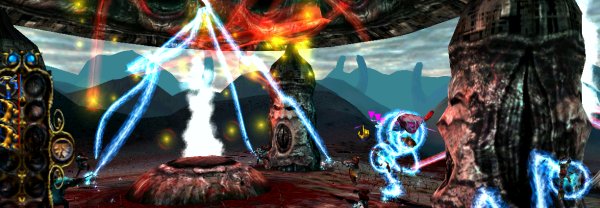
The same might be said of Sacrifice, as was said of Outcast: it was a creation whose like we will not see again. An RTS that played like a third-person action game, that looked like a surrealist painting, that spoke like a fantasy game, that used sacrificed souls collected with giant syringes as it is main resource. Sacrifice is made from same precious substance of which there isn't enough to go around. In fact, there seems to be a genuine possibility that this game might have used it all up.
TIE Fighter
RELEASE DATE: 1994
IMPORTANCENESS: A nerdy high, I guess.
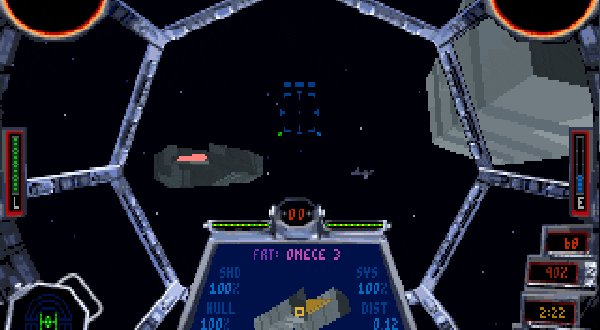
This is the best Star Wars game. Sorry, I can't think of one that I prefer. You can take your Lego, your Jedi Knights, your old Republics, and your assaulting rebels, and drop them down the tube for things under Bespin. TIE Fighter, which allows you to play through the career of a lowly pilot, working your way up to acting as Vader's wingman, is the most satisfying Star Wars experience. That's pretty important. I think any studio in the world could make a good space game, just by copying this.
Neverwinter Nights
RELEASE DATE: 2002
IMPORTANCENESS: Fairly low.

In the big scheme of RPGs, the original Neverwinter Nights really doesn't register all that profoundly, and my colleagues will no doubt speak of other, far more significant games. What was extraordinary about NWN, however, was that it managed to take the naming scheme from Baywatch Nights and then create an RPG that - finally - was hinged on decent technology. We played a four-player RPG at lunchtimes in the PC Gamer office. This is the only time I can ever remember that happening. Later, we played user-made adventures, which is a vital and wonderful thing. In terms of broad-spectrum importance, this game sits fairly low, but I think its accomplishments merit a tip of the hat to where it sits on my shelf, gathering dust.
Eve Online
RELEASE DATE: 2003
IMPORTANCENESS: Nothing like as important as it should have been.

Whenever I talk about Eve Online, I have to be careful to remember this: it changed nothing. Eve Online can only really be understood on its own terms. That it exists, and has existed, is an amazing thing, because it is the only MMO that is actually a “living world”, or a “virtual world”, in the sense that we were promised when the idea of the MMO was coming to light. Yet, while the vast, war-mongering universe of Eve has generated a symphony of astonishing battles, and a babbling catalogue of controversies and tall tales, it has done almost nothing to influence the trajectory of the MMO genre as a whole. Eve, perhaps, is a brown dwarf somewhere remote on the fringes of the galaxy: warm enough to genuinely support satellites crammed with life and interesting evolution, but ultimately an oddity, and with little influence on the wider constellation, which revolves on one axis: that of World Of Warcraft. It's been my endless frustration that there is no alternative to Eve. Perhaps its one copy-cat game, Perpetuum Online, can one day be that. Maybe not.
Also see: Ultima Online.
The Typing Of The Dead
RELEASE DATE: 2000
IMPORTANCE: Not that high, but we had to include it somewhere.
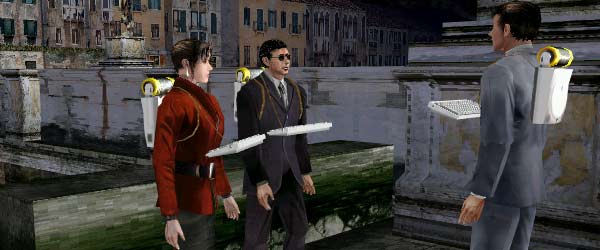
The importance of this game is that it made both typing tutor programs and light-gun games actually fun. That means it fixes two entire genres by creating another one. Few games can boast that. Also: the dudes with keyboards strapped to their waists were beautifully weird. Actually, I've emailed Sega to ask if they have any plans to bring this minor classic out on any digital distribution networks. They are looking into it. UPDATE: Sega just said "no comment" at the time of going to press.
Flashback
RELEASE DATE: 1992
IMPORTANCE: Some.

The importance of this side-on sci-fi adventure was that it both taught me what rotoscoping was, and allowed me to pass my GCSE French, because I played it in French for some reason. These reasons for importance may not apply to other people playing the game today. However, it taught us that French people can often make amazing videogames, and that platform games don't have to be about grotesquely-proportioned plumbers. These were, and remain, vitally important lessons.
Also see: Another World.
Please note that this post is but one fragment of a larger list, which in total covers over 100 of what RPS feels is the PC’s most important games (but not all of them). You can find the other parts to date here. More is yet to come.
This feature has been kindly sponsored by:











